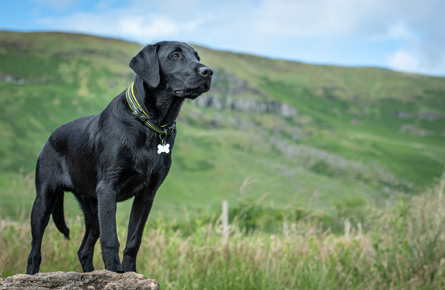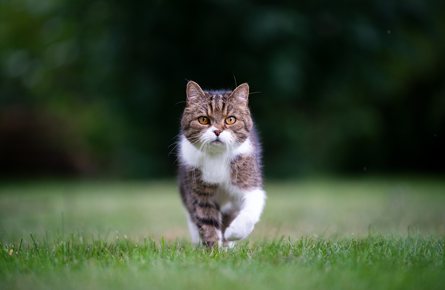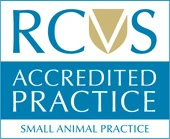
Pet Microchipping in Oxford
All dogs in the UK must now be microchipped, and owners must maintain current contact information. Although dogs are exempt from this regulation, we also advise microchipping your cats to increase the likelihood that they will be found if they disappear.
In addition to encouraging responsible pet ownership and expediting the process of identifying an owner in an emergency, this law aims to reduce the number of stray animals. Maintaining up-to-date contact details in the microchipping database is similarly crucial since erroneous information may make it more challenging to safely return your pet.
Book a microchipping appointment
What Is Microchipping?
Microchipping is a permanent identifying method that involves placing a small chip—roughly the size of a rice grain—under your pet's skin. A portable scanner can read your pet's unique identifying number thanks to this quick and very painless process.
The majority of veterinarians, including our clinic at Boundary Vets, as well as rescue organisations and local government agencies, have access to these scanners. The identifying number is connected to your contact information on a central database, which makes it simple to call and reconnect missing dogs with their owners.
Every microchip has a code that is exclusive to your pet. Following implantation, your contact information and your pet's identity are entered into the national microchipping database. Maintaining current contact information is essential to finding missing dogs and bringing them back to their owners.
Book a microchipping appointment
Which Animals Should Be Microchipped?
It is legally required for dogs and puppies to be microchipped by the time they are eight weeks old in order for their ownership to be transferred, but it is also strongly advised for cats, rabbits, and other pets.
Be advised that you might be fined up to £500 if you don't microchip your dog. Pets travelling overseas also need to obtain an Animal Health Certificate and be microchipped.
Pet Microchipping at Boundary Vets
Because the operation is minimally uncomfortable and may be done during a normal appointment, no anaesthesia is necessary. Our staff can quickly scan your pet to verify if they already have a microchip if you're not sure.
You must fill out a registration form at Boundary Vets before your information is added to the national database for microchipping. The registration fee is included in the procedure's cost, and it is valid for the duration of your pet's life.
Every microchip used at Boundary Vets complies with International Standards (ISO), guaranteeing that dogs travelling under the Pet Passport program may have their microchips read by scanners overseas.
Get in touch with your local Boundary Veterinary Clinic to arrange an appointment or for more information. Our welcoming staff is pleased to help.
Book a microchipping appointment
Why Choose Boundary Vets For your Pet Microchipping
Selecting a veterinarian to microchip your pet is a crucial choice that will ensure their safety. At Boundary Vets, we take great pride in offering a dependable, knowledgeable service that prioritises the health of your pet. Thanks to our knowledgeable team, high-quality microchips, and comprehensive support, we make the procedure simple and stress-free for both you and your pet. Whether you're microchipping a dog, cat, or rabbit or preparing your pet for travel, Boundary Vets can provide trustworthy care and peace of mind.
Here at Boundary Vets we aim to provide you with:
- Experienced veterinary staff and friendly customer service
- Comprehensive support throughout your pet microchipping process
- ISO-Compliant microchips to meet international standards
- Microchip checking services so you can double check and avoid duplication issues
- A friendly and reliable service when you contact and visit us here at Boundary Vet Oxford
Frequently Asked Questions For Pet Microchipping
What is a Microchip?
A microchip is a small implant approximately the size of a grain of rice. Once your pet has been microchipped, it will sit under the skin and, when scanned, will provide the scanner with a bar code number.
THE MICRO-CHIP DOES NOT CONTAIN YOUR PERSONAL INFORMATION.
What Does Pet Microchipping Involve?
The process of implanting a microchip is straightforward and involves injecting the tiny chip beneath your pet's skin using a syringe. Our veterinarians or nurses can perform this. You fill out a form with your information, your pet's information, and—above all—your contact information. This form is sent to our microchip company, which uses your information to register the chip we inserted. For your records, we will also provide copies of your pet's unique microchip number.
Why Should I Microchip My Pet?
In the UK, microchipping all dogs older than eight weeks becomes mandatory as of April 2016. Above all, microchipping allows you to identify your pet as yours. Veterinary clinics and rescue centres frequently scan injured or stray animals that are brought in as strays. These animals are frequently beloved pets rather than strays, and if they are microchipped, the concerned owner can be quickly located and brought back together.
Is Microchipping Permanent?
Generally speaking, the answer is yes. The chip will stay beneath your pet's skin after it has been inserted. The chip will frequently shift from where it was first injected. Professionals will use the microchip scanner to examine the entire animal because they are aware of this! Please be aware that after a microchip has been injected, it may emerge. This is quite uncommon. If, after being implanted, your pet's microchip cannot be located, Boundary Vets in Oxford will replace it at no additional cost.
Can All Pets Be Microchipped?
Most pets can be microchipped including larger birds and tortoises. If you are unsure if your pet can be microchipped please contact us, and our knowledgeable team will discuss the best options for you.
What Happens If I Move To A New House?
You must update your contact information with your microchip company whenever you relocate. Boundary Vets can update your information on your veterinary file and give you the phone to call.








